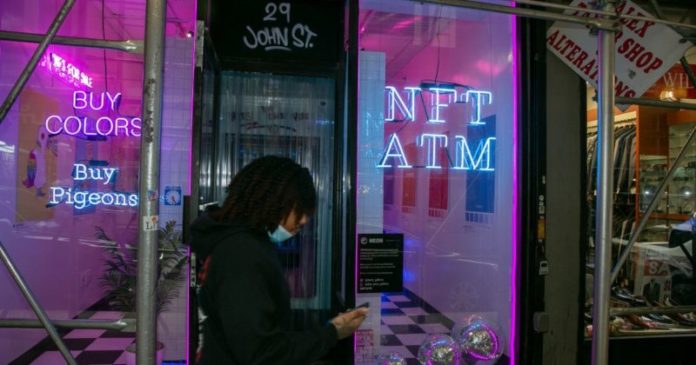Non-fungible tokens or NFTs have been hyped as the next step in the evolution of Web 3.0, promising unique ownership of digital assets in what has become a multibillion-dollar asset class, but a new report casts doubt on that promise.
NFT holders may not own the intellectual property (IP) rights of the assets they’ve purchased, according to Alex Thorn, head of research for Galaxy Digital.
“The vast majority of NFT art projects … convey no actual ownership for the underlying content,” Thorn told CoinDesk TV.
One of the major problems with NFTs today is that NFT issuers administer them, according to new report from Galaxy Digital.
NFT artwork is worth about $118 billion with projects such as CryptoKitties, Rare Apepe, and CryptoPunks making headlines. Brands such as Nike and Prada have adopted the use of NFTs. The most expensive NFT art ever sold so far is “The Merge,” a virtual artwork designed by an artist nicknamed Pak. It was auctioned on Dec. 6, 2021, for $91.8 million on the Nifty Gateway marketplace.
However, the hype surrounding NFTs appears to be cooling amid the slowdown in NFT markets and the crypto price dip. Concerns are growing fast over the legal and compliance aspects of NFTs, according to JDSupra.
Global NFT sales fell 25 percent in the second quarter amid the crypto slump.
Galaxy Digital looked at 25 of the top NFT projects and found that most come with a license from the issuer, who oversees how the license is governed and how token holders can use the content within the license.
Are you interested in getting smart on Life Insurance?
No Doctor Visit Required, Get Policy for as low as $30 per Month
Click here to take the next step
“When you buy one of these tokens … you’re not buying the media that the metadata points to, you’re actually buying a license from an issuer,” Thorn told CoinDesk.
Only one project examined by Galaxy, World of Women (WoW), “even attempts to give true ownership for the underlying artwork,” to token holders, Thorn told CoinDesk. Even so, it was still unclear if the original issuer of a WoW NFT would need to transfer the IP address to a secondary buyer if they were to sell on another marketplace, such as OpenSea.
The Bored Ape Yacht Club (BAYC) licensing agreement says that when a person buys an NFT they “own the underlying Board Ape, the Art, completely.”
“That is objectively false,” Thorn said. “The holder of the token does not own the art completely. If they did, Yuga Labs (one the largest NFT issuers) would not need to provide a license to them.”
Thorn argues that token issuers, including Yuga, may have “misled NFT purchasers as to the intellectual property rights for the content they are selling.”
The NFT licenses can be changed, revoked or amended anytime, for no reason, Thorn said. And because issuers still hold IP rights, they can make changes without notifying the holders of the token.
With the value of NFTs falling, issuers could determine whether the industry grows further, Thorn said. “If you think NFTs are this revolution and digital property rights, which many do, we’re a long way off.”
Photo: A person walks by a 24-hour non-fungible token vending machine near Wall Street in New York City, Feb. 24, 2022. Customers receive a small box with a QR code to register a declaration of ownership of a virtual artwork on the Solana blockchain. (AP Photo/Ted Shaffrey)
Credit: Source link






















 Bitcoin
Bitcoin  Ethereum
Ethereum  Tether
Tether  Solana
Solana  USDC
USDC  Lido Staked Ether
Lido Staked Ether  XRP
XRP  Dogecoin
Dogecoin  Toncoin
Toncoin  Cardano
Cardano  Shiba Inu
Shiba Inu  Avalanche
Avalanche  TRON
TRON  Wrapped Bitcoin
Wrapped Bitcoin  Bitcoin Cash
Bitcoin Cash  Polkadot
Polkadot  Chainlink
Chainlink  NEAR Protocol
NEAR Protocol  Polygon
Polygon  Internet Computer
Internet Computer  Litecoin
Litecoin  Uniswap
Uniswap  LEO Token
LEO Token  Dai
Dai  First Digital USD
First Digital USD  Ethereum Classic
Ethereum Classic  Aptos
Aptos  Hedera
Hedera  Stacks
Stacks  Mantle
Mantle  Cronos
Cronos  Filecoin
Filecoin  Stellar
Stellar  Renzo Restaked ETH
Renzo Restaked ETH  Cosmos Hub
Cosmos Hub  Render
Render  OKB
OKB  Immutable
Immutable  Pepe
Pepe  XT.com
XT.com  Arbitrum
Arbitrum  Maker
Maker  Bittensor
Bittensor  Optimism
Optimism  Wrapped eETH
Wrapped eETH  dogwifhat
dogwifhat  The Graph
The Graph 
